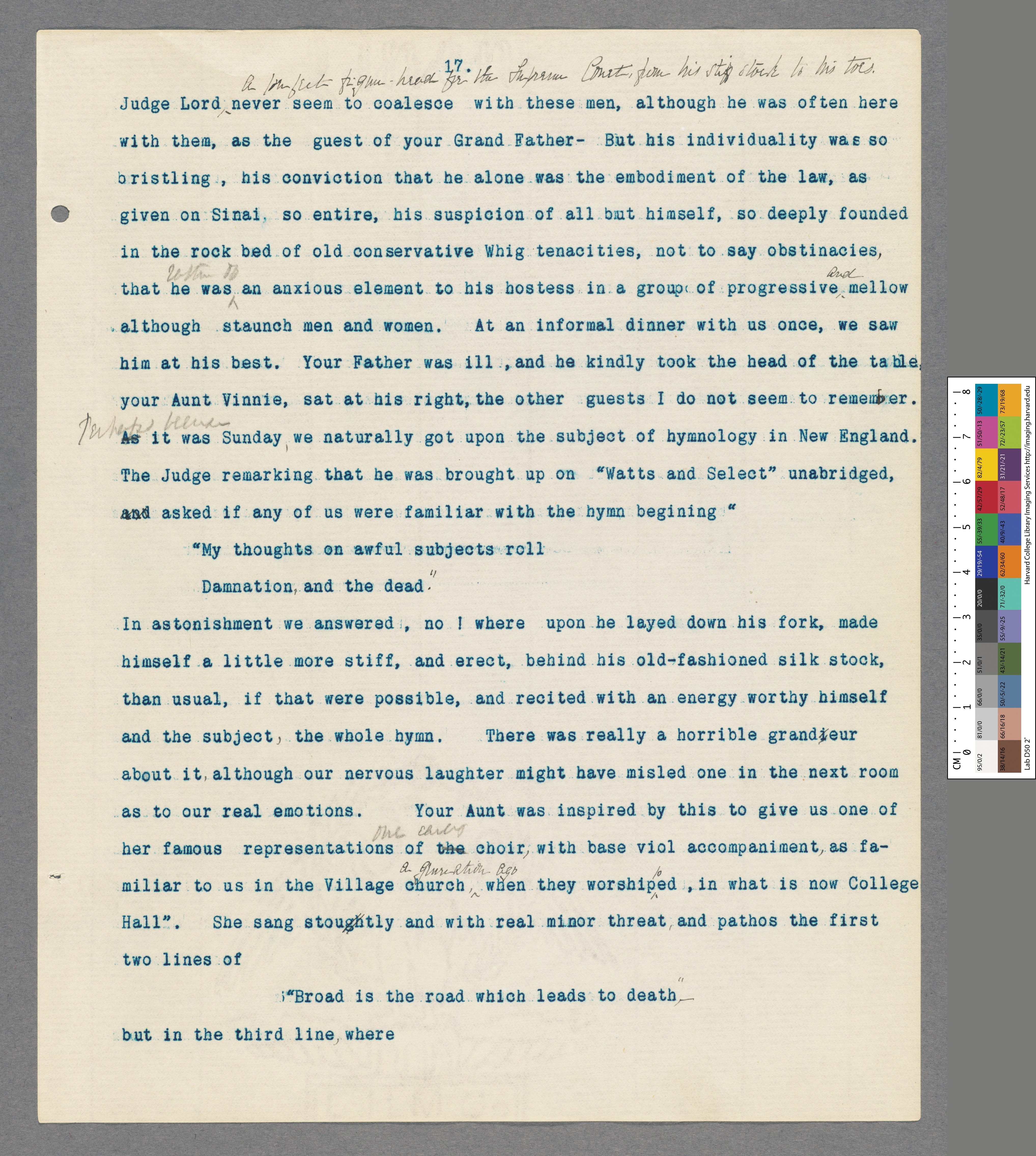Manuscript:

Transcription:
---------------------------------------------------------------------------------------------------------------------------------
17
Judge Lord, a perfect figure-head for the Supreme Court, from his ? stock to his toes,
[carry-on from previous line] never seem to coalesce with these men,
[carry-on from previous line] although he was often here
with them, as the guest of your Grand Father - But his individuality was so
bristling, his conviction that he alone was the embodiment of the law, as
given on Sinai. so entire, his suspicion of all but himself, so deeply founded
in the rock bed of old conservative Whig tenacities, not to say obstinacies,
that he was [?] of an anxious element to his hostess in a group of progressive
with them, as the guest of your Grand Father - But his individuality was so
bristling, his conviction that he alone was the embodiment of the law, as
given on Sinai. so entire, his suspicion of all but himself, so deeply founded
in the rock bed of old conservative Whig tenacities, not to say obstinacies,
that he was [?] of an anxious element to his hostess in a group of progressive
[carry-on from previous line] and mellow
although staunch men and women. At an informal dinner with us once, we saw
him at his best. Your Father was ill, and he kindly took the head of the table,
your Aunt Vinnie, sat at his right, the other guests I do not seem to remember.
As Perhaps because it was Sunday we naturally got up upon the subject of
although staunch men and women. At an informal dinner with us once, we saw
him at his best. Your Father was ill, and he kindly took the head of the table,
your Aunt Vinnie, sat at his right, the other guests I do not seem to remember.
[carry-on from previous line]hymnology in New England.
The Judge remarking that he was brought up on "Watts and Select" unabridged,
and asked if any of us were familiar with the hymn begining [sic]"
The Judge remarking that he was brought up on "Watts and Select" unabridged,
and asked if any of us were familiar with the hymn begining [sic]"
"My thoughts on awful subjects roll
Damnation, and the dead."
Damnation, and the dead."
In astonishment we answered, no! where upon he layed down his fork, made
himself a little more stiff, and erect, behind his old-fashioned silk stock,
than usual, if that were possible, and recited with an energy worthy himself
and the subject, the whole hymn. There was really a horrible grandeur
about it, although our nervous laughter might have misled one in the next room
as to our real emotions. Your Aunt was inspired by this to give us one of
her famous representations ofthe one early choir, with base viol accompaniment, as fa-
miliar to us in the Village church, as generations ago, when they worshipped,
himself a little more stiff, and erect, behind his old-fashioned silk stock,
than usual, if that were possible, and recited with an energy worthy himself
and the subject, the whole hymn. There was really a horrible grandeur
about it, although our nervous laughter might have misled one in the next room
as to our real emotions. Your Aunt was inspired by this to give us one of
her famous representations of
miliar to us in the Village church, as generations ago, when they worshipped,
[carry-on from previous line] in what is now College
Hall". She sang stoutly and with real minor threat and pathos the first
two lines of
Hall". She sang stoutly and with real minor threat and pathos the first
two lines of
"Broad is the road which leads to death -"
but in the third line, where



